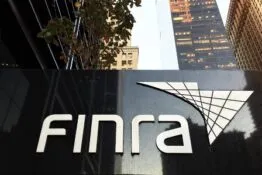
William B. Fretz, Jr., and John P. Freeman, both of Oaks, Pennsylvania, were found by the Financial Industry Regulatory Authority (FINRA) Department of Enforcement to have engaged in business-related conduct that is inconsistent with just and equitable principles of trade as a consequence of providing misleading information to FINRA and filing a false Form U4. Department of Enforcement v. Fretz, Jr., et al., No. 2010024889501 (Dec. 17, 2015).
The Decision indicated that Fretz and Freeman, as fiduciaries of Covenant funds, had engaged in business-related misconduct. From 2008 through 2010, Covenant had received approximately $10,000,000 from various sources for investments in two direct marketing startups, IXI Corporation (a privately-held data marketing company) and PetFood Direct, an online seller of pet supplies. Approximately $300,000 was invested in equity investments, $900,000 was used to make arms-length transactions to third parties, and $3,000,000 was used to pay off debt, make distributions to investors, and pay professional fees. According to the Decision, the remaining funds, which totaled $5,400,000, were transferred to Fretz, Freeman, and the entities in which they had an interest which included Keystone and Keystone Holdings.
The Department of Enforcement found that Fretz and Freeman, in their capacity as Covenant’s General Partner, characterized transfers from Covenant to themselves and their business as loans or distributions in an opportunistic fashion that benefited them to the detriment of Covenant and its investors. The characterizations, according to FINRA, disregarded the actual substance of the transfers and changed over time to maximize their personal benefit. FINRA found that Fretz and Freeman had transferred funds from Covenant to Fretz for his personal and business interests, and Fretz had unfairly profited as a result. The Decision stated that by transferring money to Fretz, Fretz and Freeman breached their fiduciary duty owed to Covenant investors, and thereby engaged in business-related conduct that was inconsistent with just and equitable principles of trade in violation of NASD Rule 2110 and Rule 2010.
FINRA found that Fretz and Freeman also violated NASD Rule 2110 and 2010 for transferring money to Freeman, as a Limited Partnership Agreement prohibited a General Partner from maintaining a negative balance in the General Partner’s account. FINRA further found that Fretz and Freeman took money out of Covenant to bolster their financially ailing broker-dealer. Fretz and Freeman reportedly did not offer any credible business justification for the transfer of substantial sums to Fretz, Freeman, and their businesses when the General Partner was obligated to invest the money for the benefit of Covenant investors.
The Decision additionally indicated that when Fretz and Freeman allocated Covenant’s 2009 profit, they had impermissibly ignored the high water mark provisions of Covenant’s governing documents and allocated $374,535 more than what they should have to the General Partner (and themselves) at the expense of the other Covenant investors. FINRA found that by doing so, Fretz and Freeman had breached their fiduciary duties to Covenant investors, and violated the ethical requirements of NASD Rule 2110 and FINRA Rule 2010.
The Decision further stated that Fretz and Freeman had made material misrepresentations and omitted material facts to Covenant investors. Fretz and Freeman reportedly failed to disclose to Covenant investors that they transferred money from Covenant to themselves and their business entities, had obtained interest-free loans from Covenant, and made a self-interested $1,400,000 alleged loan from Covenant to Keystone.
According to the Decision, representations in Covenant’s governing documents were rendered misleading or false as a result of Fretz and Freeman’s failure to apply the high water mark, failure to invest in securities as opposed to making capital withdrawals and self-interested loans, failure to ensure that the General Partner would not unfairly profit, and failure to maintain the appropriate General Partner capital account balance.
The Decision additionally indicated that Fretz and Freeman had made misstatements to FINRA by providing false and misleading information in response to three FINRA information requests. Fretz and Freeman were found to have violated Rules 8210, which states that the duty of members and their associated persons to cooperate with FINRA investigations and respond fully to FINRA’s 8210 requests is unequivocal.
Public disclosure reveals that William B. Fretz, Jr. has been subject to six disclosure incidents. On February 22, 2008, Fretz became subject to a pending customer dispute, where the customer alleged unsuitable recommendations. He was subject to a tax judgment/lien of $35,022.42 on March 20, 2011, and a civil judgment of $2,077,856.31 on June 14, 2011. He was also subject to another civil judgment on October 15, 2012, for $331,897.84.
On September 23, 2015, the United States Securities Commission permanently barred Fretz and Freeman from acting as a broker and investment adviser, or otherwise associating with firms that sell securities or provide investment advice to the public, assessed sanctions of $500,000, disgorgement of $5,476,928, and assessed a monetary penalty of $353,582.00 in connection with allegations of an offering fraud and investment fraud orchestrated by sales of a partnership interest in a Fund and the operation of its adviser. SEC Admin Releases 33-9925; 34-75967, IA release 40-4206; Investment Company Act release 40-31847 (Sept. 23, 2015).
Public disclosure records reveal that John P. Freeman has been subject to six disclosure incidents. On December 12, 1990, Freeman settled a customer dispute for $11,865.00 after the client alleged unsuitability, misrepresentation and unauthorized trading of MGM bonds. On December 18, 1990, Freeman settled a customer dispute for $11,652.00 after the client alleged misrepresentation and unauthorized sales of MGM bonds. Freeman became subject to a pending customer dispute on February 22, 2008, where a customer complained that unsuitable recommendations were made.
Section 10(b) of the Exchange Act makes it unlawful “to use or employ, in connection with the purchase or sale of any security registered on a national securities exchange or any security not so registered, any manipulative or deceptive device or contrivance in contravention of such rules and regulations as the Commission may prescribe as necessary or appropriate in the public interest or for the protection of investors.”
Four elements are necessary to show in finding a violation of Section 10(b) of the Exchange Act, Rule 10b-5: 1) misrepresentations and/or omissions were made; 2) misrepresentations and/or omissions were material; 3) representations and/or omissions were made with requisite intent (e.g. scienter), and 4) misrepresentations and/or omissions were made in connection with the purchase or sale of securities.
Guiliano Law Group
Our practice is limited to the representation of investors. We accept representation on a contingent fee basis, meaning there is no cost to unless we make a recovery for you, and there is never any charge for a consultation or an evaluation of your claim. For more information contact us at (877) SEC-ATTY.






